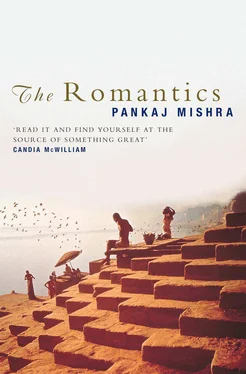Pankaj Mishra - The Romantics
Здесь есть возможность читать онлайн «Pankaj Mishra - The Romantics» весь текст электронной книги совершенно бесплатно (целиком полную версию без сокращений). В некоторых случаях можно слушать аудио, скачать через торрент в формате fb2 и присутствует краткое содержание. Год выпуска: 2001, Издательство: Anchor Books, Жанр: Современная проза, на английском языке. Описание произведения, (предисловие) а так же отзывы посетителей доступны на портале библиотеки ЛибКат.
- Название:The Romantics
- Автор:
- Издательство:Anchor Books
- Жанр:
- Год:2001
- ISBN:нет данных
- Рейтинг книги:4 / 5. Голосов: 1
-
Избранное:Добавить в избранное
- Отзывы:
-
Ваша оценка:
- 80
- 1
- 2
- 3
- 4
- 5
The Romantics: краткое содержание, описание и аннотация
Предлагаем к чтению аннотацию, описание, краткое содержание или предисловие (зависит от того, что написал сам автор книги «The Romantics»). Если вы не нашли необходимую информацию о книге — напишите в комментариях, мы постараемся отыскать её.
The Romantics — читать онлайн бесплатно полную книгу (весь текст) целиком
Ниже представлен текст книги, разбитый по страницам. Система сохранения места последней прочитанной страницы, позволяет с удобством читать онлайн бесплатно книгу «The Romantics», без необходимости каждый раз заново искать на чём Вы остановились. Поставьте закладку, и сможете в любой момент перейти на страницу, на которой закончили чтение.
Интервал:
Закладка:
Pankaj Mishra
The Romantics
ONE
1
WHEN I FIRST CAME TO BENARES in the severe winter of 1989 I stayed in a crumbling riverside house. It is not the kind of place you can easily find any more. Cut-price ‘guest houses’ for Japanese tourists and German pastry shops now line the riverfront; touts at the railway station and airport are likely to lead you to the modern concrete-and-glass hotels in the newer parts of the city. The new middle-class prosperity of India has at last come to Benares. This holiest of pilgrimage sites that Hindus for millennia have visited in order to attain liberation from the cycle of rebirths has grown into a noisy little commercial town.
This is as it should be; one can’t feel too sad about such changes. Benares — destroyed and rebuilt so many times during centuries of Muslim and British rule — is, the Hindus say, the abode of Shiva, the god of perpetual creation and destruction. The world constantly renews itself and when you look at it that way, regret and nostalgia seem equally futile.
The past does live on, in people as well as cities. I have only to look back on that winter in Benares to realize how hard it is to let go of it.
It was pure luck that I should ask the pujari at the riverside temple about cheap places to rent at the very moment Panditji came in with his offering of crushed withered marigolds. Panditji, a tiny, frail, courteous old musician, overheard our conversation. He saw me as a fellow Brahmin who had fallen on hard times and he offered to help. With his oversized rubber flip-flops slapping loudly against the cobblestone paving, he led me through narrow winding alleys, past large-eyed cows and innumerable little shrines to Hanuman, to his house. We went up steep stairs, past two identical enclosed courtyards on the ground and first floors, off which opened a series of dark bare rooms, to a tiny room on the roof. Panditji, his white wrinkled hands fumbling with the large padlock and the even larger bolt, unlocked the door. I saw sunlight streaming in through a small iron-barred window that looked out on to a temple courtyard; whitewashed walls; a cot with bare wooden boards; a writing table and straight-backed wicker chair; fluffs of dust on the rough stone floor. The room, Panditji said, could be mine for just 150 rupees, what he called ‘Indian’ rent, meals not included.
Oddly, I hardly ever spoke to Panditji again. He spent his days in a haze of opium under a pile of coarse wool blankets. In the evenings he would awaken sufficiently to give sitar lessons to American and European students — all identical with their long hair, tie-dyed shirts and stubbly, emaciated, sunken-eyed look. I saw him occasionally, wearing a muslin dhoti and white Gandhi cap, carrying a pail of milk back to the house from the corner sweetshop, the skin on his exposed bony legs shrivelled and slack, his sacred thread dangling from under his woollen vest. We nodded at each other, but never exchanged more than a word or two. All my dealings were confined to his arthritic wife, Mrs Pandey, who lived in one of the dark bare rooms on the first floor with her family retainer, Shyam; she had long cut off all contact with her husband, and claimed not to have gone downstairs for over fifteen years. The tenants lived in two small bedsitters on the roof, and I shared the view of the river, the sandy expanses beyond it and the brooding city towards the north, the looming cupolas and minarets, the decaying palaces and pillared pavilions, with Miss West.
Miss West (as she was called by the local shopkeepers — it was weeks later that I discovered her first name was Diana) was English, middle-aged and, from what I could tell, well-to-do — she presumably paid the ‘foreign’ rent for her room. The perception that Miss West, with her clean high forehead, hazel-brown eyes, slender neck and straight blonde hair, now flecked with grey, had been very beautiful at one time came to me only later, when I was more accustomed to the physiognomies of white Europeans. Her presence in Benares, in a tiny room on the roof, where she appeared to do nothing all day except read and listen to Western classical music, was a mystery to me. I thought it had to do with some great sadness in her past. It was a large judgement to make on someone I didn’t know at all. But the impression — seemingly confirmed by the serene melancholy she gave off as she sat on the roof, a Pashmina shawl draped around her shoulders, and gazed at the river for long hours — this impression came out of the mood I lived with for those first few exceptionally cold days in Benares, the thick mists rising from the river and shrouding the city in grey, the once hectic bathing ghats now desolate, the sad-sweet old film songs from an unseen transistor radio in the neighbourhood reaching me weakened and diffused as I lay huddled under multiple quilts in my chilly damp room, trying to read The World as Will and Idea .
It was the kind of book that idleness made attractive. So many long hours of wisdom and knowledge it promised! It was why I had come to Benares after three years in the nearby provincial town of Allahabad, where I had been an undergraduate student at a decaying old university. In Benares, I wanted to read, and do as little as possible besides that. The city, its antiquity, its special pleasures, held little attraction for me.
But the weather made for a special kind of gloom. It brought back memories of an earlier visit to Benares. I was seventeen years old then. Hastily summoned from Allahabad, I had come with my father to perform the last rites for my mother. It was then I’d had, tinged with my confused grief and sense of loss, my first impression of the city. The thick river mists through which we rowed one cold early morning to scatter my mother’s ashes; the priest with the tonsured head reciting Sanskrit mantras in a booming voice and waving incense sticks over the rose petals bobbing on the ash-smeared water; the temple bells and conches ringing out in unison from the great mass of the city — these were the memories, almost phantasmagoric, I had of that visit, and they kept coming back to me during those first few days in Benares.
I read slowly but understood little of The World as Will and Idea . Nevertheless, I soldiered on. Other big books awaited their turn in the small octagonal niches in the whitewashed walls of my room where, when I first arrived, vermilion-spattered clay idols of Krishna and Vishnu had stood; and frequently, in the middle of reading, I would look up and let my eyes wander over the thick multicoloured spines and grow impatient at the slow progress I was making, at the long interval that separated me from those other books.
*
Then the mists lifted and a succession of cloudless days followed. The river gleamed and glinted in the midafternoon sun. Bright red and yellow kites hung high in the clean blue sky. Children appeared on the bathing ghats; the uneven cobblestone steps came to be chalk-marked with hopscotch rectangles; scrawny drug pushers lurked on temple porches where chess players sat hunched over tattered cardboards; pilgrims dressed and undressed all day long in a slowly turning kaleidoscope of Indian colours: the South Indians in their purple Kanjeevaram silk saris, the visitors from Rajasthan unwinding the spools of yellow and crimson turbans, the widows from Bengal in their austere white cotton. In the evenings, the funeral pyres in the distant north of the city were like glow-worms in the gathering dusk.
I abandoned Schopenhauer and started on Turgenev’s Torrents of Spring . Miss West, who put on the first of the flowery summer dresses I was to see her in, said, ‘What wonderful weather! We must celebrate, we must have a party.’ This sudden familiarity puzzled me. Did the ‘we’ include me? I had exchanged only a few words with her. One of the very first things she said to me was: ‘Where did you learn to speak such charming English?’ I hadn’t known what to make of this remark. Was she being complimentary or condescending? One sunny morning on the roof, as she lay in her sagging charpoy, her legs partially exposed in a way I thought immodest, the oval frames of her sunglasses accentuating the whiteness of her skin, a mysterious haunting melody floating out of her room — Beethoven’s Archduke Trio , I later came to know — one morning, she had asked me about my undergraduate years in Allahabad. ‘You see, Rudyard Kipling wrote for a newspaper published from Allahabad — how do you pronounce it?’ she said. ‘But tell me: did you enjoy yourself there? And why did you choose Allahabad of all places?’ She spoke with a sharp emphasis, in short rapid sentences, her voice demanding a similarly precise and brief response.
Читать дальшеИнтервал:
Закладка:
Похожие книги на «The Romantics»
Представляем Вашему вниманию похожие книги на «The Romantics» списком для выбора. Мы отобрали схожую по названию и смыслу литературу в надежде предоставить читателям больше вариантов отыскать новые, интересные, ещё непрочитанные произведения.
Обсуждение, отзывы о книге «The Romantics» и просто собственные мнения читателей. Оставьте ваши комментарии, напишите, что Вы думаете о произведении, его смысле или главных героях. Укажите что конкретно понравилось, а что нет, и почему Вы так считаете.












